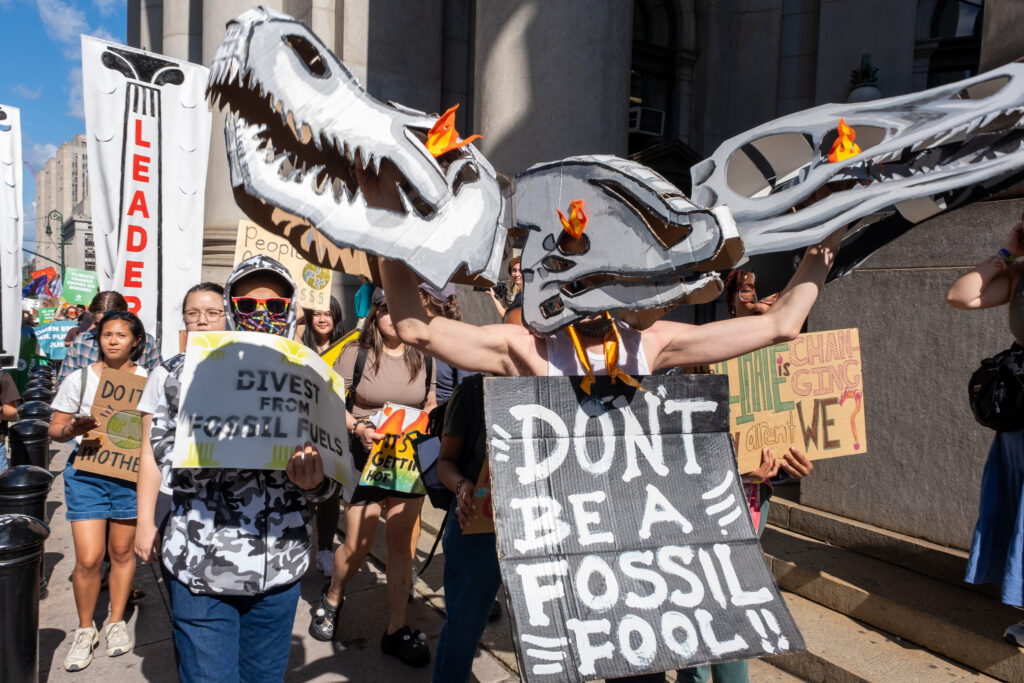NEW YORK—Hundreds of young people and their allies walked out of school and work on Friday to demand an end to fossil fuel production to combat the climate crisis.
The strike, organized by the local chapter of Fridays for Future, was part of a global call to action and occurred ahead of NYC Climate Week. This annual event, organized by the nonprofit Climate Group, coincides with the United Nations General Assembly session and gathers world governments, the private sector, and nonprofit leaders to discuss climate challenges and solutions.
“We protest because the world hasn’t listened,” said 17-year-old activist Lorelai Crean. “For years, scientists, activists, and people with lived experiences have been sounding the alarm about the climate crisis. Today we walked out of over 25 schools across the city to amplify that alarm. The threat posed to our planet by the fossil fuel industry and climate change has never been clearer.”
Strike organizers aim to send a clear message to business leaders, lawmakers, and financial institutions participating in climate week: young people will not stand for greenwashing or false solutions and demand a swift phase-out of oil, gas, and coal production. Explore the latest news about what’s at stake for the climate during this election season.
“We need to focus on equity, justice, and ending the era of fossil fuels,” said 16-year-old organizer Lena Goings. “We cannot beat around the bush with this; we have to make sure this is our focus.”
Fridays for Future activists target the financial sector funding fossil fuels, the polluting companies, and lawmakers with regulatory powers. One demand is for New York Gov. Kathy Hochul to sign the Climate Change Superfund Act. This bill, which has passed both the state Senate and Assembly, would require companies contributing significantly to greenhouse gas emissions to help cover infrastructure investments needed for climate adaptation.

Proponents urge Hochul to sign the bill quickly, arguing that New York taxpayers face rising costs due to extreme weather. The Business Council of New York has urged Hochul to veto the bill, arguing it will hurt bottom lines.
Hochul’s office did not confirm whether she plans to sign the bill. Paul DeMichele, Hochul’s deputy communications director for energy and environment, stated that “the Governor will review the legislation.”
NYC strikers were joined by climate activists from across the country and other nations, including Bangladesh, Ecuador, Mexico, Taiwan, and Uganda. The march began in Manhattan’s Foley Square and moved across the Brooklyn Bridge to Borough Hall, where activists spoke about the climate crisis and their personal experiences living near extractive industries.
“In my country, climate activism is not a choice, it’s a matter of survival.”
— Hilda Flavia Nakabuye, Fridays for Future Uganda activist
Speakers included Louisiana activist Roishetta Ozane and her 12-year-old daughter, Kamea, who spoke about growing up in a heavily polluted community and suffering from asthma.

“I should be able to go outside and play with my friends instead of being worried about what’s going to happen tomorrow or the next day,” said Kamea Ozane. “This is not okay. I say we need to stop the funding of fossil fuels and put the people over the profit.”
Hilda Flavia Nakabuye, a 27-year-old activist from Uganda, has helped organize campaigns against the East African Crude Oil Pipeline. Nakabuye joined the march to remind decision-makers at Climate Week and the U.N. General Assembly about their power to help global communities impacted by fossil fuel development.
“In my country, climate activism is not a choice, it’s a matter of survival,” Nakabuye said. “We bear the full weight of a crisis that we did not create. Every day we face rising temperatures, drought, mudslides and landslides that claim people’s lives, destroy homes and devastate our farms.”
Last month, 21 activists, including 6 members of Fridays for Future Uganda, were arrested for peacefully protesting the pipeline in Kampala. Activists in Uganda face violent crackdowns, and Nakabuye emphasized the need for global solidarity.

“We live in a country with a repressed civic space and most of the solidarity that we require right now is global solidarity,” Nakabuye stated. “Protesting is not safe” in Kampala.
Strike participants from Latin America also called for global solidarity and condemned “green colonialism.”
“Our problem is not only fossil fuels but extractivism and capitalism,” said Xananine Calvillo with the Stop Financing Factory Farming Coalition. “Any source of energy or food can become a source of exploitation under capitalism, a source of disparities that will put other cultures and societies under pressure of a capitalism and neoliberal system that threatens life for the only reason that it can become a source of profit.”
Original Story at insideclimatenews.org
